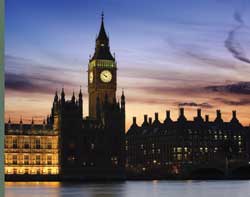Parliament's ICT office is concluding a two-year review of whether its democratic responsibilities and technical ambitions will force it to purge Microsoft's Silverlight multimedia technology from its computer systems.
As part of a root and branch overhaul of parliamentary computing,the use of Silverlight will be an early test of the government's new open standards policy.The issue is to be settled in a matter of weeks.

Foremost in the systems overhaul is"Open Hansard",a platform that will publish official records of parliamentary proceedings as data feeds.The Parliamentary ICT office(Pict)is building this on a redevelopment of its seven-year-old Parliamentary Information System(Pims),which includes an open-source project that is being treated as a possible model for future work.
Parliament has employed both open standards and Open Hansard in pursuit of a long-standing aim to encourage democratic participation by giving people live,indexed data feeds derived from parliamentary proceedings.
John Angeli,director of parliamentary broadcasting,said he was looking at video formats as part of a relaunch of Parliament.tv,due in the New Year.
Priority for open standards in Parliament
"We are absolutely in the thick of that right now,"he said."Our approach is always to maximise our reach and if it's possible to provide that in open standards then that is the road we would want to go down."
Parliament's choice of video format will have implications for other major technology initiatives it is pursuing,including the release of video streams under a revamped broadcast licence with an accompanying device that will allow anyone to embed footage of parliamentary proceedings in their websites or applications.
The Broadcast Unit is also working with the British Film Institute to digitise its archive of 85,000 video and audio tapes,an effort for which the choice of format will be crucial.
Parliament adopted Microsoft Silverlight,an alternative to Adobe's dominant Flash technology,to deliver its broadcasts on the Parliament.tv website,after its internet contractor Two Four became a Silverlight developer in 2007.It went with Microsoft's platform because its Broadcast Unit had already been digitising its recordings in Microsoft's proprietary Windows Media Video format.
The Broadcast Unit's choice tied Pict into using Microsoft software to deliver the recordings online in a Microsoft format.Pict had been pushing the broadcast team to adopt open standards and open source software formats since at least 2009,to remove any technological barriers between parliament and citizens.
Government open standards policy
The government's open standards policy,published earlier this month,decreed that government bodies must not allow their choice of computing standards to impose undue costs on citizens or businesses-for example,by making their digital interactions contingent on a particular brand of technology.It strove for the widest possible public participation,as well as preventing proprietary software standards tying public bodies into a particular supplier's application software.
The Broadcast Unit had been immovable because its broadcast licence-through which it sold retransmission rights of parliamentary recordings-strictly forbade redistribution of its media.Microsoft's Windows format was designed in a way that helped it impose licence controls.
But Angeli's office broke up Parliamentary Broadcasting Unit Ltd(Parbu),its 23-year-old cost-sharing venture with TV broadcasters BBC,ITV,Channel 4 and 5 last summer.It had been in operation since 21 November 1989,the date Parliament first allowed television cameras to record its proceedings.
Parbu was finally dissolved in May this year,just as Angeli went to the House of Lords Information Committee with his case for turning parliamentary broadcasts into a democratic,internet asset.
Angeli tore up the old broadcast licence and fee structure,arranged for Parliament to shoulder its broadcast costs-1m pound annually,according to Parbu's last accounts-and is now arranging to make it possible for anyone to embed parliamentary broadcasts in their web pages.
Pict has meanwhile been drawing up a list of open data standards to turn Hansard,Parliament's official written record,into a public asset.
"It will enable us to integrate our data into the emerging semantic web,so that others can interrogate and reuse it more effectively,"said Tim Youngs,business manager for information and online services at Pict.
"It has also enabled us to reuse the work of others and thereby avoid reinventing wheels."
Pict spent three years rebuilding Pims as what Youngs described as a modular framework.It developed all but one of eight modules in-house.It has to date settled on seven open standards:http,Atom,RDF,SPARQL,Opensearch,XML and Dublin Core Metadata.
"We have plans now to build on the new framework over the next two to three years,making more material available for tagging and searching and using the enriched data produced to enhance the material we make available on the Parliament website,"said Youngs.
Microsoft declined to comment.





